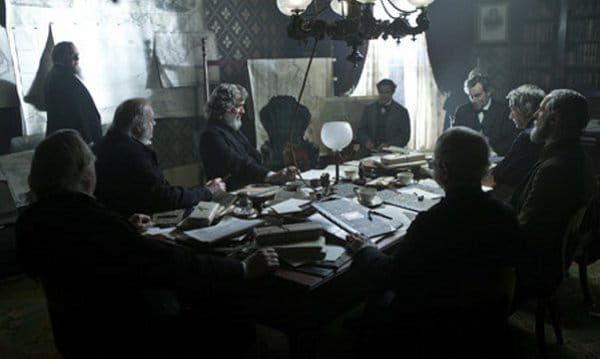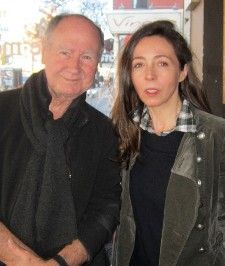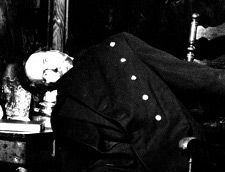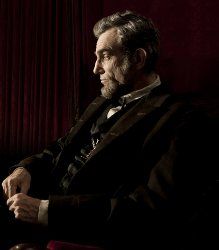 |
| Bill Raymond says Spielberg 'simply knew the craft and the art' |
I first got to know the actor Bill Raymond at the US premiere for Lars von Trier's Dogville at the New York Film Festival. One day before Epiphany, on the first weekend of the New Year, the café in Manhattan's East Village where I met up with Bill, still smelled of pumpkin pie and cloves.
Anne-Katrin Titze: Tell me about working on Lincoln! How long were you filming? You had no scenes outdoors, am I correct?

Bill Raymond: The building that we worked in was a Statehouse in Richmond. I was there for a period of four weeks. Most of the film was done around Richmond, Virginia. The scenes I did with Lincoln (Daniel Day-Lewis) in his office, and Thaddeus Stevens' (Tommy Lee Jones) office, those were sets, like most of the scenes in the White House. They got a warehouse and filmed them there. I was also performing in A Christmas Carol (as Ebenezer Scrooge) at the same time, going back and forth to Hartford, Connecticut.
AKT: How does it feel to be the Speaker of the House?
BR: I was quite honored to be there and humbled. I mean, I was one of 400 people in that building in that Statehouse which was our House of Representatives.
AKT: Did you have Mrs Lincoln (Sally Field) there in the audience when you were filming your scenes?
BR: She was there from time to time. I saw her. I never got to meet her. She was up in the balcony. I was one of a big cast. I interacted most with (David) Constable who played Representative Ashley and Stephen Spinella (who portrayed Asa Vintner Litton in Lincoln) from Angels in America. And (screenwriter) Tony Kushner, who was great.
AKT: Kushner was on set often?
BR: Oh yes, the entire time, and he was so supportive. And then there's Steven Spielberg who is a really awesome person, and brilliant.
AKT: What kind of direction did he give you for Colfax?
BR: He said "Cut! Do it again!" Pretty much like that. Sometimes he would say: "Stay very still and move your eyes to the right. And now to the left".
AKT: Eye movement direction!
BR: Yes, it's all about the shot, you know. The other direction he gave me was: "You're not using your gavel at all, are you?" So I started using the gavel a lot and he cut everything with the gavel out, of course. (Bill does get attention in the House of Representatives)
AKT: As the Speaker of the House, the audience is at times waiting for you to make order, because there is such chaos.
BR: And I did! I did make order. There was one time when people were screaming at me, yelling wildly and I was pounding the gavel and it was really an exciting scene. Gone.
AKT: There is a sense of excitement, a kind of historical excitement that can be felt in this film, in this room with all the actors. You don't always get that with costume dramas.
BR: I think that everyone, well I don't know about everyone, but my sense was that this was shared by everyone I worked with. There was a sense of history. Not just because of the theme. The history of our country, the history of an entire civilization, because of the effect it had on slavery. I also felt that I was in a film that was historic. The making of it felt historic, because it was so impressively done.
AKT: Tell me about working with Janusz Kaminski (director of photography, who has shot all of Spielberg's movies since Schindler's List in 1993).
BR: The cinematographer, Kaminski was so so smart about it, so easy with himself. It was like watching a great artist at work. He was quite jolly and made jokes but you could see his eyes were like a hawk's. And with Spielberg himself, one had the same sense, that he knew what he was going to do every day. There was no storyboard, no "oh what are we going to do today?" He simply knew the craft and the art. I knew that he knew how he wanted to make this movie.
AKT: Kushner's script is partly based on Doris Kearns Goodwin's book Team Of Rivals: The Political Genius Of Abraham Lincoln.

BR: It's largely based on the book. She was there too. It was a great experience for me. A marker. Tony Kushner could speak volumes on any point if you had a question. He spent a lot of time with Daniel Day-Lewis before the making of the movie. I'd never met him before. He told me that he had seen my work.
AKT: You mentioned that you hadn't been given the whole script. What were some of the surprises when you saw the finished movie? Not necessarily connected to your performance, but the general look of things.
BR: The scene that surprised me the most, which probably surprised the entire audience the most, was the one with James Spader (WN Bilbo, one of three hired men to ensure votes for passage of the 13th Amendment), when Lincoln walks in and they are all sitting around not doing anything. And Lincoln talks to them about getting the votes and Spader looks up and sees the President come in and says: "Well, I'll be fucked," this might not be the exact quote. I thought that was hilarious. I admired his work… David Strathairn (a convincingly troubled Secretary of State, William Seward) looked gorgeous, he is so beautiful here, when he walked up, I hardly recognised him. I know him. I worked with him with John Sayles (in City of Hope) and on (Sam Shepard's) A Lie Of The Mind. A lot of people I knew. Jared Harris, who plays Grant.
AKT: Did you have any scenes together? Your character Colfax became Vice President to his President Grant historically. BR: You may recall that I did a piece called Cold Harbor, which was based on the memoirs of Ulysses S Grant. I did that for maybe seven years. Not continuously, but all over the world, actually.
AKT: You and Jared Harris knew each other before filming?
BR: From a theatrical production of Hamlet (directed by Tom Gilroy in 2001) He played Hamlet, I played Claudius. We didn't have any scenes together in Lincoln, though.
AKT: It could be an interesting follow-up. A play about how the two of you continue on to the White House and the Presidency of the United States.
BR: I loved what he did in Mad Men (Jared Harris as Lane Pryce). What I loved most about the production of Hamlet was that I got to meet his father (Richard Harris). He was so impressive, a true Shakespearean scholar.
AKT: Lincoln, the film, gives very little headroom. The highest head, often yours in the House of Representatives, is the cut-off point, as though you enter a tightly wrapped package of history, a historical box.
BR: I never noticed that. That's a great observation.
AKT: There is hardly a sliver of sky. The performances too, have a tightness, an urgency. Lincoln is played with much sympathy and proximity by Daniel Day-Lewis as a president who touches things and people.

BR: Well, Daniel Day-Lewis, I haven't spoken to him more than 10 words. Because he walks in, he plays his scene, he leaves, and then he stays all by himself. He doesn't interact much. He is so immersed in the work he is doing, which is a portrayal of this fellow, Abraham Lincoln, that he doesn't wish to be called by his name. You could call him Mr President, you could call him Abe, or Mr Lincoln. That's off the set! And he's listed on the call sheet as The President. And it says president played by the president. Colfax, played by Bill Raymond.
AKT: I don't know of any other portrayals of Schuyler Colfax. You're the first one on film that I know of.
BR: I don't know of any. And he was Grant's vice president. Grant was absolutely idolised. When he died, they wrapped all of lower Manhattan in black bunting. My character was born in New York, moved to Indiana and settled there and became a representative of the state of Indiana and became a forceful spokesperson for the new Republican Party. In this film, of course, the republicans are portrayed as the good guys. The democrats and pacifists have a point, though. They wanted to end the war. The republicans were on the right side at that point. They were the abolitionists.
AKT: What I gathered, Colfax was sacrificed in some scandal with railroad bribes.
BR: Right. And it wasn't Colfax's fault, it was Grant's. The piece I was in (Cold Harbor), which was an anti-war piece, used some of that information. Joe Papp (former director of the Public Theater and producer of Shakespeare in the Park), who produced it together with Mabou Mines, loved Grant so much, Grant was a hero of his.
AKT: Spielberg's portrayal of slavery is very careful, compared to Tarantino's in Django Unchained. The bloodiest Lincoln gets is a wheelbarrow of severed limbs.
BR: He is very careful. You do get the notion but you don't get the sight what continuing the war means. Thousands and thousands of people. Andersonville (Georgia, the former Camp Sumter) is the result of that. The Union refused and Grant refused to exchange prisoners. In the film the emotion is rooted pretty much in the personage of Lincoln himself and Tommy Lee Jones's character who suffered so much. Thaddeus literally had to be carried in on a chair to vote. I don't know why Spielberg didn't do it here. I loved the scene with Tommy Lee Jones in the end.
In Abraham Lincoln's words, as dictated in a communication to General Ulysses S Grant: "Can we choose to be born? Are we fitted to the times we are born into?" Day-Lewis's performance reminded me of John Singer Sargent portraits because of the way he caresses, almost pets, those around him, which stands in stark contrast to the formality of attire and situation.
As a dignified Speaker of the House of Representatives Schuyler Colfax in Lincoln reminds us all: "This isn't usual. This is history".





















